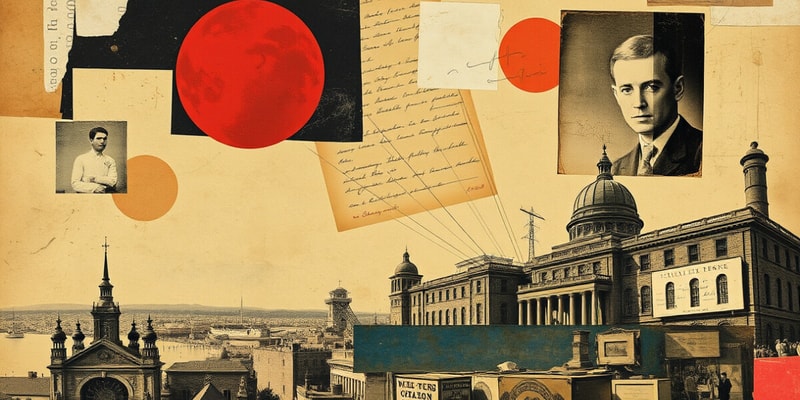Podcast
Questions and Answers
Which of the following best describes the role of an archaeologist?
Which of the following best describes the role of an archaeologist?
Anthropologists only focus on ancient human history.
Anthropologists only focus on ancient human history.
False
What is the main focus of a historian?
What is the main focus of a historian?
To study and write about the past.
The period in history when man started to write is called _____
The period in history when man started to write is called _____
Signup and view all the answers
Match the type of historical sources with their examples:
Match the type of historical sources with their examples:
Signup and view all the answers
Which of the following is considered a non-written source of history?
Which of the following is considered a non-written source of history?
Signup and view all the answers
Artifacts and fossils are examples of written sources.
Artifacts and fossils are examples of written sources.
Signup and view all the answers
What is the purpose of the historical method?
What is the purpose of the historical method?
Signup and view all the answers
What is the primary role of historians?
What is the primary role of historians?
Signup and view all the answers
The word 'Historia' comes from a Latin origin meaning 'knowledge acquired through inquiry.'
The word 'Historia' comes from a Latin origin meaning 'knowledge acquired through inquiry.'
Signup and view all the answers
What is one significance of studying history?
What is one significance of studying history?
Signup and view all the answers
Studying history increases ________ awareness and understanding.
Studying history increases ________ awareness and understanding.
Signup and view all the answers
Match the following methods of acquiring historical knowledge with their descriptions:
Match the following methods of acquiring historical knowledge with their descriptions:
Signup and view all the answers
Which of the following best describes traditional understanding of history?
Which of the following best describes traditional understanding of history?
Signup and view all the answers
History is solely about significant events and not the people involved.
History is solely about significant events and not the people involved.
Signup and view all the answers
What does modern understanding of history emphasize?
What does modern understanding of history emphasize?
Signup and view all the answers
Study Notes
Role of Historians
- Historians analyze available sources to select the most relevant for historical research and study.
- They organize the past, allowing for a structured understanding of historical narratives.
- Recovering the past enables people to recognize the ongoing significance of historical memories.
Meaning of History
- Traditional understanding defines history as the study of past events, described through chronological records.
- History serves as a systematic narrative about a specific people, country, period, or individual.
- Modern understanding of history, derived from the Greek "Historia," emphasizes knowledge gained through inquiry and investigation.
- Historical sources include oral traditions, epics, songs, artifacts, architecture, and collective memory.
Importance of History
- Studying history is crucial for understanding our past, which informs our comprehension of the present.
- It enhances insight into various cultures, increasing cross-cultural awareness and understanding.
- Knowledge of one's own history fosters personal identity and shapes the future.
Division of History
- Pre-History: A time without written records; studied through fossils and artifacts by archaeologists and anthropologists.
- History: Begins with the advent of writing and record-keeping, analyzed through various written materials.
Historical Method
- A collection of techniques and guidelines utilized by historians to research and document the past.
Archaeologist vs Anthropologist
- Archaeologists study human history and prehistory through site excavation and artifact analysis.
- Anthropologists focus on humanity, exploring cultural practices, traditions, and what defines human experience.
Historical Sources
- Objects or testimonies that historians rely on for depicting the past.
- Tangible remains include artifacts, ruins, fossils, and artworks.
Types of Historical Sources
-
Written Sources:
- Published materials and manuscripts.
-
Non-Written Sources:
- Oral history, artifacts, ruins, fossils, visual art, video recordings, and audio recordings.
Studying That Suits You
Use AI to generate personalized quizzes and flashcards to suit your learning preferences.
Related Documents
Description
This quiz covers the fundamental concepts of history, focusing on the nature and importance of studying historical events. It highlights the role of historians in selecting relevant sources and organizing the past for better understanding. Test your knowledge on the essential aspects of historical study and its significance.




